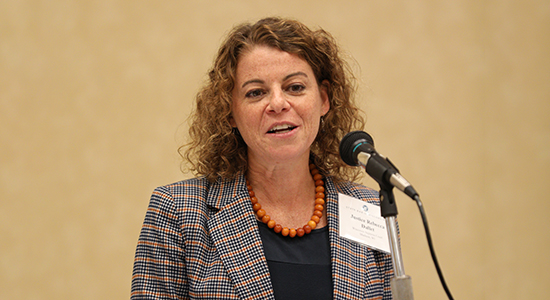
"We must engage in real study about the real world impact of our decisions," said Wisconsin Supreme Court Justice Rebecca Dallet, the newest member of the court, in opening remarks at the State Bar Board of Governors meeting in Sheboygan.
Visit the State Bar’s Facebook page for more photos of this event, or click here.
Sep. 24, 2018 – Equality and disparate incarceration were central themes in remarks that Wisconsin Supreme Court Justice Rebecca Dallet, the newest member of the court, presented at the State Bar of Wisconsin’s Board of Governors’ meeting recently.
The 52-member Board of Governors (board) convened in Sheboygan this past Friday and Saturday for the first meeting of the fiscal year (July 1, 2018 to June 30, 2019). Justice Dallet, invited to speak, discussed the court’s role in addressing inequality.
“We must engage in real study about the real world impact of our decisions,” said Justice Dallet, former circuit court judge in Milwaukee County.
“Yes, we must follow the law. We must interpret it without favor or bias. But we must also recognize that our state is rightly criticized for the data that show clearly how people of color, especially African Americans, are being left behind.”
She noted that Wisconsin incarcerates a much higher percentage of African Americans than whites. “We can no longer accept that reality,” Justice Dallet said.
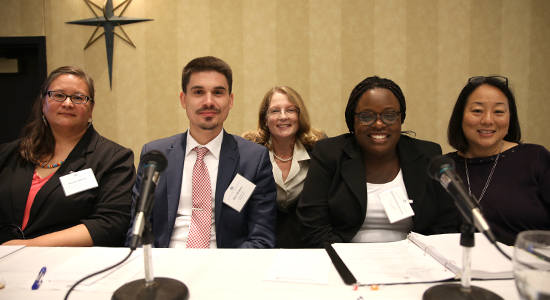
From left: attorneys Toni Caldwell, Jair Alvarez, Jill Kastner, Truscenialyn Brooks, and Kathleen Chung, spoke candidly on "How to Make Diversity a Priority" in the legal profession, during a joint orientation between the State Bar Board of Governors and bar leaders from State Bar sections, divisions, and committees. Kastner, State Bar president-elect, served as the moderator.
“When we identify and recognize that policies have disparate racial impact, the courts can step in and demand a change,” she noted. “But let’s try to get there before the supreme court of a state has to step in.” She said the criminal justice system isn’t just a discussion for lawyers, but a “discussion for all the people of our state and our country.”
Justice Dallet said we can overcome differences. “Our future lies not in division, but also not in uniformity. It lies in accepting and honoring our differences. It lies in building diverse communities, and in actively seeking justice wherever and whenever we can.”
Justice Dallet, one of six women on the seven-member court, kicked off an historic moment for the State Bar. For the first time, a majority of board members are women.
Board Supports ICWA/WICWA Pro Hac Vice Petition
Nonresident attorneys appearing in Wisconsin courts in cases brought under the federal Indian Child Welfare Act (ICWA) and the Wisconsin Indian Child Welfare Act (WICWA), which seek to protect the best interests of Indian children, would be exempt from pro hac vice rules under a pending petition (18-04) the board voted to support.
Currently, nonresident lawyers seeking pro hac vice admission must associate with local counsel, provide certain information, and pay a nonrefundable fee of $250 per case. Nonresident military counsel are exempt from the pro hac vice rule.
Petition 18-04 seeks a similar exemption for nonresident counsel who represent Indian Tribes in ICWA/WICWA cases. Petitioners, counsel for Menominee Indian Tribe of Wisconsin, say the pro hac vice rule is particularly burdensome for attorneys working on those cases. They filed a petition in July, with a supporting memo.
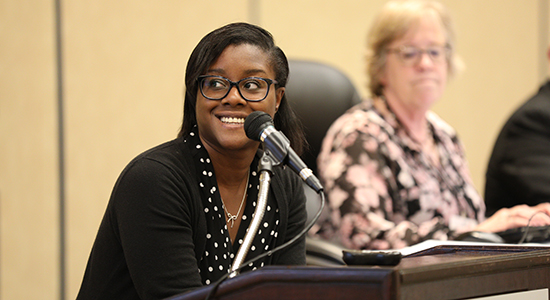
Dist. 2 Gov. Kori Ashley, Milwaukee, gave a presentation on the roles and responsibilities of board members.
The petitioners noted that tribes receive federal grants for child and family services but they cannot be used to pay the costs and fees for legal representation in ICWA/WICWA cases, and tribes often intervene in out-of-state cases involving tribal children.
Time is of the essence in these cases, petitioners say, and the costs, the number of appearances, and the requirement of attaining local counsel create barriers. Without an exemption, nonresident counsel may face charges of unauthorized practice of law.
Board Supports Petition on Default Judgments
The board voted to support a proposed modification to Wis. Stat. section 806.02, relating to default judgments. The proposed amendment would allow parties filing counterclaims or cross claims to move for a default judgment when an opposing party fails to timely reply. Currently, the default judgment rule only grants plaintiffs the right to move for default judgment if the defendant timely fails to reply.
The Wisconsin Judicial Council requests the modification through petition 18-03, submitted to the Wisconsin Supreme Court in April. The state supreme court has rulemaking authority to create and modify rules of pleading, practice, and procedure. The State Bar’s Litigation Section Board previously voted to support the petition.
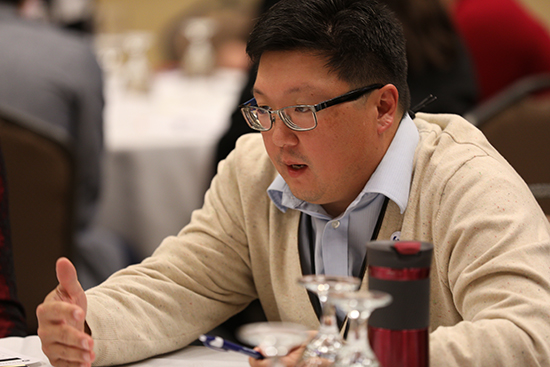
Michael Yang, board liaison for the Wisconsin Asian American Bar Association, participates in roundtable discussions on diversity and inclusion at a joint orientation between the State Bar Board of Governors and bar leaders from State Bar sections, divisions, and committees.
Visit the State Bar’s Facebook page for more photos of this event, or click here.
Board Will Seek Amendments to Lawyer Referral Service Rules
The State Bar will file a petition to establish a privilege for communications between the State Bar’s Lawyer Referral and Information (LRIS) staff members and persons seeking lawyer referral assistance, and to provide immunity from suit for conduct of LRIS staff members in the course of their official duties. The petition, which will be submitted to the Wisconsin Supreme Court, will also seek to establish the confidentiality of the communications between LRIS staff and the members of the public who call LRIS.
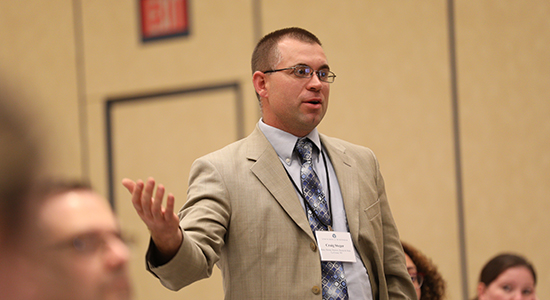
Dist. 5 Gov. Craig Steger, La Crosse, participates in a discission on "How to Make Diversity a Prority" in the legal profession.
Other Business
The board approved a Nomination Committee, appointed by State Bar President Chris Rogers, to seek nominees for the positions of State Bar president-elect, State Bar treasurer, and State Bar appointee on the Wisconsin Judicial Council.
Milwaukee attorney Jill Kastner (State Bar president-elect), New Richmond attorney Deanne Koll (former State Bar board chairperson), Madison attorney Makda Fessahaye (former Wisconsin Association of African American Lawyers Association liaison to the State Bar board), and Green Bay attorney Bob Gagan (former State Bar president) will serve on the Nomination Committee.
The board also approved section bylaw amendments, requested by the following sections: the Elder Law Section; the International Practice Section; and the Solo Small Firm and General Practice Section.
Upon request, interested members may obtain a copy of the minutes of each meeting of the Board of Governors. For more information, contact State Bar Executive Coordinator Jan Marks by email or by phone at (608) 250-6106.
